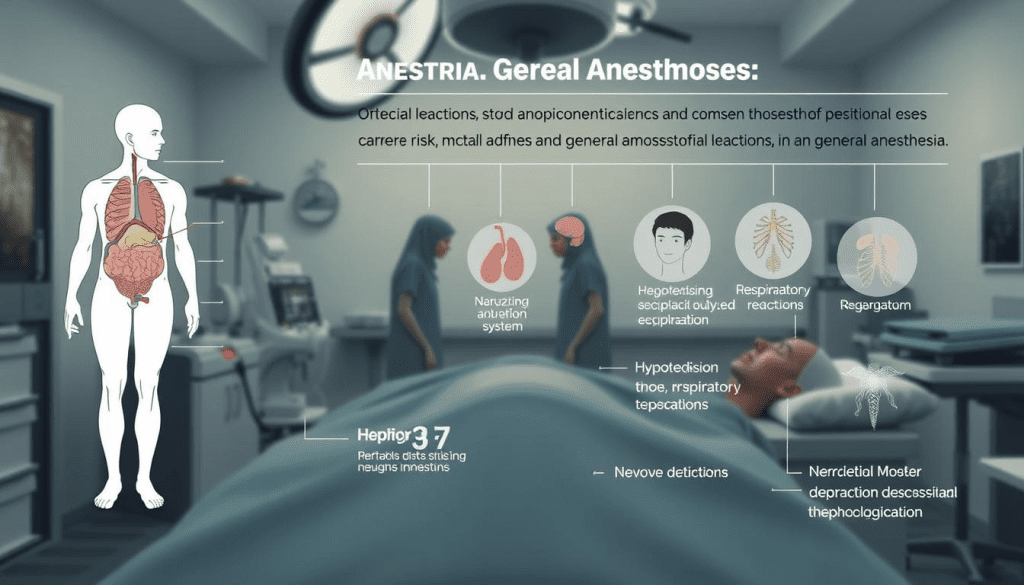General anesthesia is a state induced by administering drugs. It causes a controlled, reversible loss of consciousness and analgesia. While it is generally safe, certain individuals are at a higher risk of complications.

We use a combination of medicines, known as anesthetics, to bring on a sleep-like state. This is before and during surgery or other medical procedures. Certain populations require meticulous assessment to ensure safe delivery of anesthesia.
Key Takeaways
- General anesthesia is not suitable for everyone.
- Certain medical conditions increase the risk of complications.
- A thorough assessment is necessary before administering anesthesia.
- Older adults and young children are among the high-risk populations.
- Pre-existing medical conditions can affect anesthesia safety.
Understanding General Anesthesia and Its Risks
General anesthesia is carefully checked for risks and benefits before use. It makes patients lose consciousness and feel no pain. This is done for surgeries to keep patients comfortable and pain-free.
How General Anesthesia Affects the Body
General anesthesia impacts many body systems. It makes the brain less active, leading to unconsciousness. It also affects the heart and lungs. Anesthesiologists watch these closely to keep patients safe.
People with serious health issues need extra care before anesthesia. For example, older adults or those with serious health problems might get confused after surgery.
During surgery, the anesthesiologist controls breathing, heart rate, and blood pressure. This helps keep patients safe but changes how their body works.
Safety Profile and Mortality Statistics
General anesthesia is safe when given by experts. But, like any treatment, it has risks. Thanks to better care and technology, fewer people die from anesthesia now.
The risk of problems depends more on the surgery and the patient’s health.
Research shows anesthesia-related deaths are rare. But older people or those with serious health issues face higher risks.
The Importance of Pre-Anesthesia Evaluation
Checking a patient before anesthesia is key. We look at their medical history and current health. This helps us make the anesthesia plan safer and more effective.
We also talk about the risks and benefits with the patient. This makes sure they understand and are okay with the anesthesia plan. This step is important for safety and the best results.
Cardiovascular Conditions That Increase Anesthesia Risks
Certain heart problems can make anesthesia riskier. It’s important to know these conditions to keep patients safe during surgery.
Severe Heart Disease Complications
Heart diseases like angina, valve issues, heart failure, or past heart attacks make anesthesia tricky. People with these issues face a higher chance of heart problems during surgery. We must check how severe the heart disease is before giving anesthesia.
Uncontrolled Hypertension Dangers
High blood pressure is a big risk during anesthesia. It can cause heart attacks and strokes during surgery. We must control blood pressure before surgery to lower these risks.
Congestive Heart Failure Patients
Congestive heart failure means the heart can’t pump enough blood. Patients with CHF are at a higher risk of heart failure problems during anesthesia. We need to check the heart’s function and improve the patient’s condition before surgery.
By managing these heart issues, we can make anesthesia safer. This ensures a safer surgery for our patients.
Respiratory and Organ System Disorders

Respiratory and organ system disorders can make anesthesia risky. It’s key to check patients with COPD and liver disease carefully. These conditions can make surgery and anesthesia tricky, needing careful planning.
COPD and Severe Asthma
COPD and severe asthma are big respiratory issues. They can make breathing hard, and anesthesia can make it worse. “A good pre-op check and lung function prep are key to lower risks,” experts say.
Testing lung function with spirometry is a must. It shows how bad COPD or asthma is. This helps us plan the anesthesia, maybe using regional anesthesia or careful general anesthesia to avoid breathing problems.
Advanced Liver Disease
Advanced liver disease is a big challenge for anesthesia. The liver helps break down anesthetics, and if it’s not working right, drugs can build up. “Liver disease can mess with blood clotting, making surgery bleed risks higher,” which means we need to check and manage patients before surgery.
- Checking liver function with blood tests and scans.
- Looking at blood clotting to predict and manage bleeding risks.
- Changing anesthetic doses based on liver health.
Kidney Disease and Anesthesia Clearance
Kidney disease, mainly in late stages, can affect anesthesia safety. It can cause imbalances in electrolytes, fluid buildup, and uremia, making anesthesia tricky. “A thorough pre-op kidney check is essential to pick the right anesthesia plan and lower risks.”
We check kidney function with creatinine levels, eGFR, and fluid status. This helps us choose the right anesthetics and manage fluids during surgery to avoid kidney injury.
High-Risk Anesthesia Patient Categories
Some patients face higher risks with anesthesia. We must carefully assess these risks to ensure their safety. High-risk patients include those with certain demographics or medical histories that make anesthesia more complicated.
Elderly Patients (Over 65)
Elderly patients, over 65, are at higher risk. The aging process affects their recovery from surgery and anesthesia. They are also at risk of confusion, pneumonia, stroke, or a heart attack after surgery.x
Infants and Very Young Children
Infants and young children are at high risk, too. Their developing bodies and airway issues require special care and equipment.
Patients with Previous Adverse Reactions
Patients who had bad reactions to anesthesia before are at higher risk. We need to review their history to identify and manage risks.
Family History of Anesthesia Complications
A family history of anesthesia problems is also a risk factor. Genetic conditions can affect how a patient reacts to anesthesia. It’s important to know their family medical history.
Understanding these high-risk groups helps us reduce risks. This way, we can ensure the best outcomes for our patients.
Additional Medical Conditions Requiring Special Consideration
Other health issues can make anesthesia care more complex. We need to plan carefully to keep patients safe.
Obesity and Obstructive Sleep Apnea
Being overweight can lead to serious problems during anesthesia. Obstructive sleep apnea (OSA) makes these risks even higher. We check for OSA and plan how to handle airway issues during surgery.
Poorly Controlled Diabetes
Diabetes, if not well-managed, can cause problems during surgery. This includes infections and slow healing. We help patients control their blood sugar before, during, and after surgery to reduce these risks.
Neurological Disorders and Stroke History
Patients with neurological issues or a history need extra care. We check their neurological status and adjust our anesthesia plan to ensure their safety.
Malignant Hyperthermia Susceptibility
Malignant hyperthermia is a rare but dangerous condition caused by some anesthetics. We identify at-risk patients and avoid using harmful agents.
By focusing on these extra health conditions, we can customize anesthesia care for each patient. This improves their safety and care.
Conclusion
General anesthesia is key in modern medicine. It lets patients have complex surgeries without pain. While it’s mostly safe, some groups face more risks because of health issues.
Understanding these risks is vital. By knowing them, we can take steps to keep anesthesia safe. This way, we ensure everyone gets the care they need.
Even though rare, anesthesia-related deaths can happen, more so with older or sicker patients. Yet, most people don’t face problems. By carefully checking each patient, we can offer top-notch care.
FAQ’s:
What is general anesthesia, and how does it work?
General anesthesia is a way to make patients lose consciousness and feel no pain. It’s done by giving drugs that calm the nervous system. This lets patients have surgery without feeling anything or knowing what’s happening.
Who should not be put under anesthesia?
Some people face more risks with general anesthesia. This includes those with serious heart problems, high blood pressure, or lung diseases. Also, the elderly, babies, and those who’ve had bad reactions to anesthesia before should be careful.
What are the risks associated with general anesthesia?
General anesthesia can lead to problems during and after surgery. These include breathing and heart issues, allergic reactions, and a rare condition called malignant hyperthermia. Certain health conditions, like obesity or diabetes, can also increase these risks.
How long does anesthesia last?
Anesthesia’s length depends on the type and amount used, and how the person reacts. Usually, its effects go away a few hours after surgery.
What is the importance of pre-anesthesia evaluation?
Pre-anesthesia checks are key to spotting risks. They look at the patient’s health history, physical state, and lab results. This helps find the safest way to give anesthesia.
Can patients with cardiovascular conditions undergo anesthesia?
People with heart issues need careful planning before anesthesia. While it’s not always avoidable, managing their condition can reduce risks.
How does anesthesia affect patients with respiratory disorders?
Those with lung problems face higher risks with anesthesia. But with the right planning and anesthetic choices, these risks can be lowered.
What are the risks of anesthesia for elderly patients?
Older adults are more at risk due to age-related changes and health issues. But with the right approach, these risks can be managed.
Can patients with a history of adverse reactions to anesthesia undergo anesthesia again?
Those who’ve had bad reactions need careful planning before anesthesia again. Using different anesthetics or techniques can help reduce risks.
What is malignant hyperthermia susceptibility, and how is it managed?
Malignant hyperthermia is a rare genetic condition that can cause severe reactions to certain anesthetics. Patients with this condition need special care and alternative anesthetics to manage their risk.
References
- Guay, J., & The Canadian Anesthesiologists’ Society. (2018). The preoperative assessment of the cardiac patient for noncardiac surgery. Canadian Journal of Anesthesia, 65(1), 1-14.








